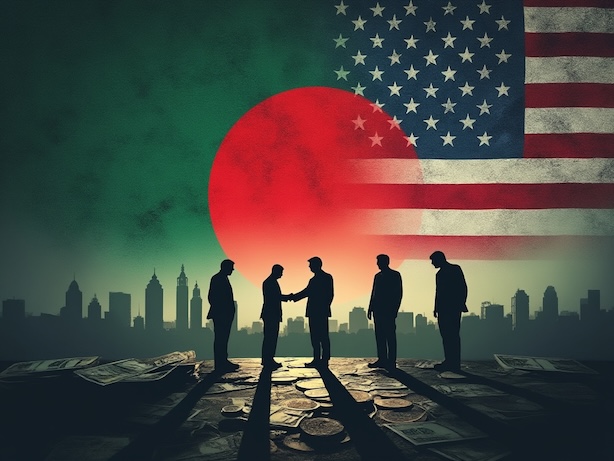America’s Return to Influence: The Removal of Hasina and Bangladesh’s Future
The political scene in Bangladesh has shifted dramatically with the recent removal of Sheikh Hasina and the installment of Muhammad Yunus as interim Chief Adviser. The sudden change in leadership has allowed the United States to reassert its influence in Bangladesh. This comes after years of strained relations, especially during Hasina’s tenure, when she openly accused the US of interfering in the nation’s political matters.
US-Bangladesh Relationship: Strain and Renewal
The relationship between the United States and Bangladesh deteriorated under Hasina, primarily due to her allegations that Washington sought her removal for not aligning with US strategic interests. This created a climate of distrust, leading to less cooperation between the two nations. However, Hasina’s ouster presents the US with a renewed opportunity to influence Bangladesh’s policies. With Muhammad Yunus, a figure close to Washington, now leading the interim government, the US has regained a significant foothold in the country.
The recent high-profile visit of a US delegation further cements this. The delegation met with Yunus and key government officials, discussing ways to rebuild institutions and restore Bangladesh’s economy. The US embassy’s statement signals America’s intent to stay deeply involved in the country’s future direction.
Muhammad Yunus: A Key Figure Aligned with US Interests
The installation of Yunus as Chief Adviser has provided the US with an ally who shares its vision for Bangladesh. Yunus, a Nobel laureate with deep connections to Washington, stands in sharp contrast to Hasina, whose regime was marked by conflict with the US. His appointment suggests that Bangladesh’s leadership is now more aligned with American interests.
Yunus acted quickly to announce reforms aimed at revitalizing the economy and addressing corruption. He launched multiple initiatives to reform the financial sector, judiciary, and police, drawing support from US officials. The delegation’s statement that “Washington DC would be happy to support his reform agenda” indicates the depth of US involvement, which raises concerns about how much autonomy Yunus’s administration really has.
US Delegation’s Strategic Involvement
The arrival of the US delegation highlights how seriously the US views its role in Bangladesh’s new political landscape. The delegation, which included top officials from the Treasury and National Security Council, met with key figures in Bangladesh to discuss everything from economic recovery to institutional reforms. The US aims to shape the country’s policies and governance in a way that aligns with its interests.
An interesting aspect of the visit is the extended stay of US National Security Council officials. According to Foreign Advisor Touhid Hossain, “US Treasury and National Security Council officials will stay in Bangladesh longer than Lu.” This suggests that their role is not merely advisory but more about setting long-term directives for the interim government. It implies that the United States is guiding Bangladesh’s leadership on policies related to security, economy, and governance, ensuring alignment with its own strategic interests.
Economic Control through Financial Assistance
The economic agreements made during the US delegation’s visit highlights the influence Washington has over Bangladesh’s policies. USAID’s commitment of over $200 million for development initiatives, including health improvements and trade expansion, provides the US with significant leverage in how these programs are executed.
These development initiatives, while beneficial on the surface, grant the United States greater control over the country’s economic framework. By providing financial support and technical guidance, the US shapes Bangladesh’s governance and institutional reforms, potentially compromising the nation’s sovereignty. The depth of this involvement raises concerns that Bangladesh is being steered to fulfill American interests rather than pursue an independent path.
The Role of the National Security Council in Bangladesh
The presence of US National Security Council officials, who will remain in Bangladesh longer than other delegation members, reveals the strategic importance of the country to US geopolitical objectives. While the financial aid and development programs are heavily publicized, the prolonged stay of national security experts points to deeper security and foreign policy concerns.
Bangladesh’s proximity to China makes it a key player in the region’s geopolitical landscape. The involvement of the National Security Council suggests that the US is positioning itself to influence not just Bangladesh’s domestic policies, but also its role in South Asia. These officials are likely providing guidance on security and defense issues, ensuring that Bangladesh’s actions align with broader US strategic goals.
US Influence Reshaping Bangladesh’s Sovereignty
The removal of Sheikh Hasina and the installation of Muhammad Yunus have created a political environment in Bangladesh that is increasingly shaped by American interests. The recent visit of the US delegation, combined with the prolonged stay of National Security Council officials, highlights the extent to which the US is guiding the new government’s policies.
While the aid and development agreements are presented as efforts to help Bangladesh, they also serve as tools for the US to exert influence over the country’s economic and political decisions. The future of Bangladesh, under the leadership of Yunus, is being closely steered by Washington, raising concerns about the country’s sovereignty and independence.

